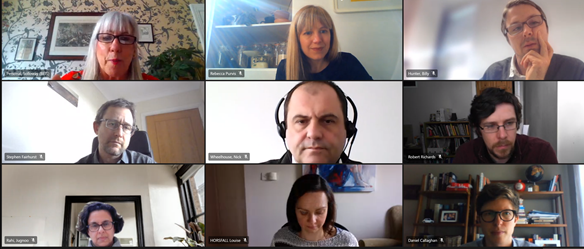Academic teams up with Shadow Secretary of State for Scotland
An Edinburgh Napier academic has taken part in an initiative which gives policymakers and research scientists the chance to experience each other’s worlds.
Dr Nick Wheelhouse, an Associate Professor in the School of Applied Sciences, was selected for the Royal Society’s Pairing Scheme.
Each year, 30 research scientists are paired with UK parliamentarians and civil servants. They learn about each other’s work by spending time together in Westminster and the researcher’s institutions.
Those taking part gain an insight into how research findings can help inform policymaking, and come away with a better understanding of how they can get involved.

The event was held online this year due to the pandemic, but Nick - pictured centre - enjoyed a hugely interesting virtual Week in Westminster, during which he was paired with Edinburgh South MP Ian Murray, the Shadow Secretary of State for Scotland.
As policy lead for the Society for Reproduction and Fertility, Nick was keen to find out more about how science informs policy.
He said: “I originally applied before Covid but, if anything, the recent increase in public scrutiny of Government scientific advice and policy had increased my interest further.
“The Royal Society team managed to put together a great programme of activities providing us with chances to interact with politicians and civil servants.
“I was the fifth academic that Ian had been paired with over the last few years, but the first biologist. We met virtually before the week of the scheme and I felt that this gave me an insight into some of the thoughts of parliamentarians about academia and provided me with a more balanced view of politics than we are often used to.
“This was something that really struck me during the week, the thoughtful and balanced way many of the politicians really engaged with science policy, particularly within the mock select committee and round table discussions.
“During these activities I was able to ask quite pointed questions to senior politicians including the Minister of Science. I don’t know where else we would be given these opportunities.”
The disciplines of the attendees ranged from nuclear energy through to biotechnology and infectious disease.
Nick said: “To get such a broad range of opinion on a broad range of scientific questions was equally as rewarding as the interaction with the parliamentarians and civil servants.
“I would without hesitation recommend the scheme to anyone thinking of engaging with Government. My one regret - I didn’t manage to attend Parliament this year. Perhaps one day. I do have an invite from Ian!”